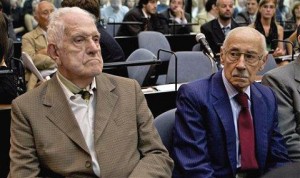NYT op-ed: Human Rights prosecutions work

Former dictators Jorge Rafael Videla, right, and Reynaldo Bignone attend their trial in Buenos Aires, Argentina, Feb. 28, 2011. Foto AP
In today’s Times, Kathryn Sikkink, a Minnesota political scientist, makes the case for the kinds of human rights persecutions that Baltasar Garzón helped institute:
My research shows that transitional countries — those moving from authoritarian governments to democracy or from civil war to peace — where human rights prosecutions have taken place subsequently become less repressive than transitional countries without prosecutions, holding other factors constant. By comparing countries like Argentina and Chile that have used human rights prosecutions with those like Brazil that have not, I found that prosecutions tended not to exacerbate human rights violations, undermine democracy or lead to violence.
More here and in Prof. Sikkink’s book, The Justice Cascade: How Human Rights Prosecutions Are Changing World Politics (buy at Powell’s and support ALBA).












